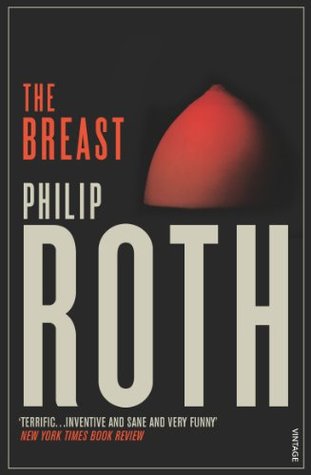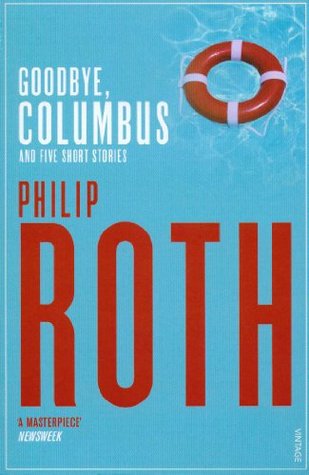Having intended, at one time, to read the books of Philip Roth in order of publication, a brick wall was soon hit with second book, Letting Go, Roth’s first novel proper and still his largest to date. It just went on and on, never serving up the satisfation of progress. Now, with that reading goal abandoned, it’s open season on Roth. But where to begin? In the end, I went for The Breast (1972), a thin slice of Roth that would hopefully whet the appetite for some more. Which it has.
The Breast is the first book in a trilogy involving Professor David Kepesh and is an extended short story that pays homage to Franz Kafka’s Metamorphosis. Where Kafka’s classic follows the experiences of the unfortunate Gregor Samsa as he, following uneasy dreams, wakes to find himself changed into a large beetle, Kepesh, thanks to a suspected “hermaphroditic explosion of chromosomes, wakes from a coma to find himself turned into a female breast.
…a mammary gland such as only could appear, one would have thought, in a dream or a Dali painting. They tell me that I am now an organism with the general shape of a football, or a dirigible; I am said to be of a spongy consistency, weighing in at one hundred and fifty-five pounds (formerly I was one hundred and sixty-two), and measuring, still, six feet in length.
Quite why Kepesh has found himself transformed is very much an irrelevance — he simply has, and how he deals with it is the subject of the book. It’s to Roth’s credit that he takes the initial idea and runs with it, ticking off the possible thoughts that someone in this predicament may encounter and doing so in a serious, contemplative manner.
Alas, what has happened to me is like nothing anyone has ever known: beyond understanding, beyond compassion, beyond comedy, though there are those, i know, who claim to be on the brink of some conclusive scientific explanation; and those, my faithful visitors, whose compassion is deeply felt, sorrowful and kind; and there are still others — there would have to be — out in the world who cannot help but laugh. And I, at times, am one with them: I understand, I have compassion, I see the joke.
Although his situation is ridiculous and consciously invites laughter, the comedy of The Breast comes not from Kepesh but from those around him. He mutters lewd requests to his nurse who talks over him, never acknowledging his advances; his doctor tries to move his life on as if nothing has happened, and his father, a retired innkeeper now wasting his days working the phones for his brother’s business, seems almost oblivious to the changes that have come over his son:
He comes to visit me once a week and seated in a chair that is drawn up close to my nipple, he recounts the current adventures of people who were our guests when I was a boy. Remember Abrams the milliner? Remember Cohen the chiropodist? Remember Rosenheim with the card tricks and the Cadillac? Yes, yes, yes, I think so. Well, this one is dying, this one has moved to California, this one has a son who has married an Egyptian. “How do you like that?” he says, “I didn’t even know they would allow that over there.” Oh, Dad, I think to say, wonders never cease…
As one may expect, a large breast isn’t going to do much moving around and so the narrative is, for the most part, internalising punctuated with recollections of memorable scenes. Beginning with the question of ‘why me?’ Kepesh’s journey continues logically until he tries to convice himself that he’s mad, that he’s in a mental ward. The question of sexual frustration, that human desire for sex that can never be sated, is a major part of Kepesh’s struggle — being an organ incapable of orgasm is a nightmare. But the pain of adapting to the transformation seems all the more tolerable when faced with the alternative:
…having been terrified of death since I was two, I have become entrenched in my hatred of it, have taken a position against death from which I cannot retreat just because This has happened to me. Horrible as This is, my oldest and most heartless enemy, Extinction, still strikes me as even worse. Then you will say, maybe This is not so horrible after all. Well, reader, you say that, if you want to. All I know is that I have been wanting not to die for so long, that I just can’t stop doing it overnight.
All around Kepesh are people intent on staying within the blandness of life. His girlfriend isn’t sexually adventurous, his doctor ignores the magnitude of events, and his father hovers over smalltalk. When pondering his situation, Kepesh questions a “churning longing” to be —
…utterly and blessedly helpless, to be a big brainless bag of tissue, desirable, dumb, passive, immobile, acted upon instead of acting, hanging, there, as a breast hangs and is there.
— and this nicely captures the idea of accepting the daftness of life and just getting on with it. This is what Roth is scrutinising in The Breast, and he successfully milks it for all it’s worth.


“his doctor tries to move his life on like nothing has happened”
Just to note your small repetition.
Nice review, but I don’t think I would like to read it.
I’ve only read one P. Roth and really didn’t like it. The premise of this story leaves me frigid (I loved Metamorphosis though, so maybe I’m just too narrow-minded for a breast-talking story).
Thanks, Nick. I was up late – very late – writing this last night and I’ve duplicated the line. Fixed it now, for the sake of neatness.
Which was the Roth you previously read? Although I do mention Kafka, Roth does mention other writers, such as Swift and Gogol, which are no doubt important here too. I didn’t think to mention those two as, having never read them, I don’t know their effect upon The Breast.
“This is what Roth is scrutinising in The Breast, and he successfully milks it for all its worth.”
Nice. A review ending to be aspired to.
…Have only read Goodbye Columbus and loved it. I am not sure which Roth to try next. I am not so sure it will be this one. Thanks for the review…
Randy
I second Randy regarding the review ending.
The rest of the review is very good too.
Thanks, Randy and Kerry. Such pay-off lines come quite naturally, which I’m always thankful for.
I can understand why this wouldn’t be the next one to read. I have noted that many go for The Ghost Writer.
I had no idea what this was about and I’m quite surprised, as I thought Roth’s novels were mostly political or historical (or both.) Surrealism doesn’t seem to fit! However, I suppose it’s quite an interesting premise – unique, funny, even quite a terrifying predicament to be in. (Moral of the story though guys: be careful what you wish for!)
Who is this non sexually adventurous girlfriend that has a relationship with a breast?
Like your other comments note, great review, but not something I’ll be reading any time soon. It’s interesting to read a review of surrealism in the written form, as opposed to in art or cinema.
Portnoy’s Complaint is a comedy, there’s a series about his fictional alter-ego (The Ghost Writer, etc.), and some alternative history The Plot Against America. Oh, and some books about dying.
To be fair, they were seeing each other before he turned into a breast.
For proper surrealism, it may be worth looking back to the 1920s/30s. The name that jumps immediately to mind, for me, is Vieteslav Nezval, a Czech surrealist, who wrote Valerie And Her Week Of Wonders: a menstrual journey with vampires, bobcats, and all manner of strangenesss floating in and out. It’s a film, too.
Fascinating stuff Stewart. I only came to Roth a few years ago and have never got to the point of digging into his back catalogue. As a fan of Kafka this one appeals but maybe I’ll stick with your informative review.
Thanks for visiting mine